Nurses' strike: Services affected as staff stage second walkout
- Published
- comments
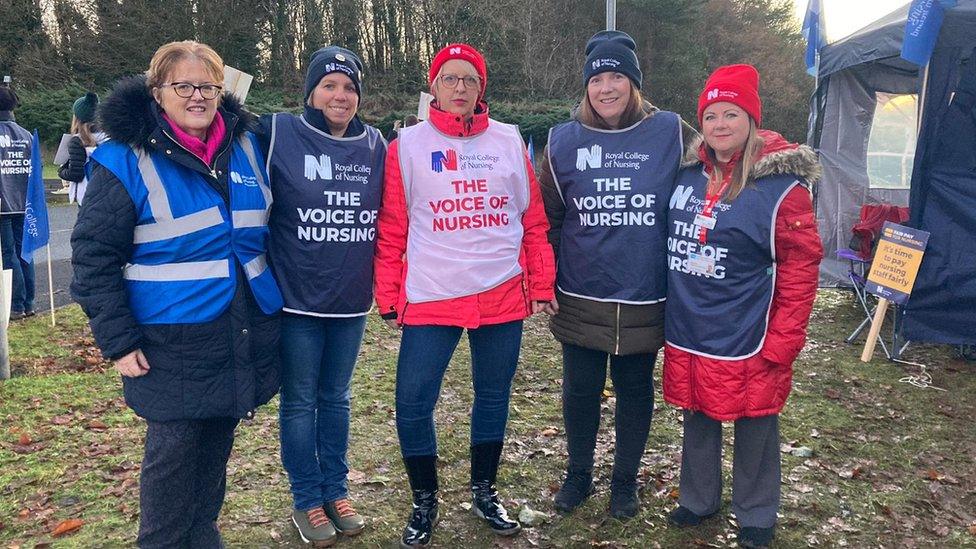
Nurses at the picket line at Antrim Area Hospital
Hundreds of hospital appointments have been cancelled as Northern Ireland's nurses stage a second day of strike action.
Last week, they joined colleagues in England and Wales in the first day of the planned two-day industrial action.
Emergency care is continuing but other services have been impacted.
The Royal College of Nursing (RCN) has warned of further strikes in the new year, which the Department of Health say would be "catastrophic".
The 12-hour strike, from 08:00 to 20:00 GMT, marks the third time in three years that Northern Ireland's nurses have been on strike over fair pay and staffing issues.
How much?
The RCN, a union representing about 500,000 nurses across the UK, has said its members are 20% worse off in terms of pay since 2010.
It has called for a pay rise of 5% above retail price index (RPI) inflation.
The government has said this is unaffordable and has not made an offer close to this amount.
A rise of 5% over RPI inflation would currently amount to a pay increase of 19%.
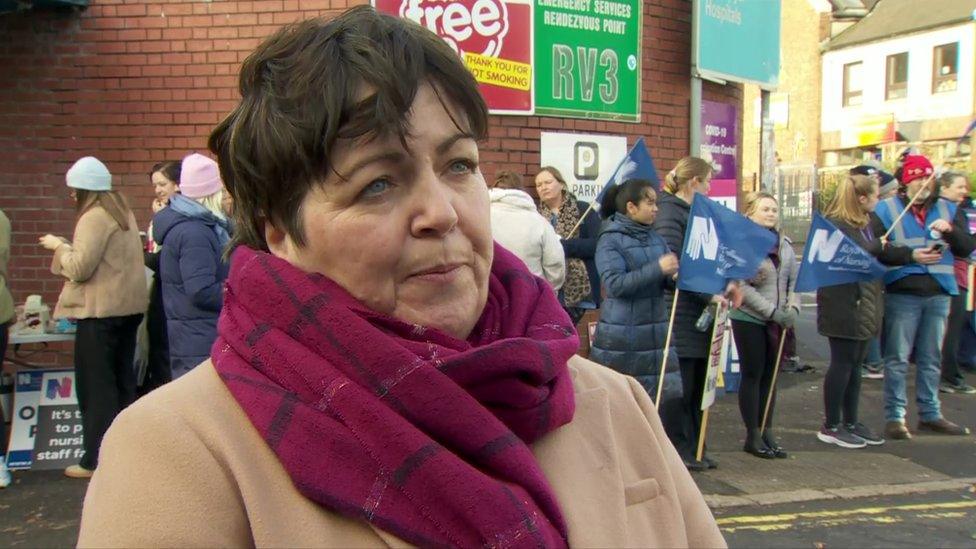
Rita Devlin from the RCN said nurses had never asked for a 19% pay rise
However, Rita Devlin, the RCN's director in Northern Ireland, said nurses had not made that demand and the figure should be set in context.
"We asked for 5% which is a restorative pay rise, because we've lost 20% in the last 10 years," she said.
She explained on top of this, they were asking for an additional pay rise that would match the rate of inflation.
"When we asked for inflation, it was at 6%. We never asked for 19%, despite what the government keeps telling you," Ms Devlin added.
She said the RCN was prepared to negotiate and called for UK Health Secretary Steve Barclay to enter more talks with unions over pay.
"We are asking for the health minister to get in to a room with nurses and have a discussion. If 19% isn't affordable, what is?"
Northern Ireland's nurses say they will not be held to ransom
More strikes
The union said it will set the government a 48-hour deadline after strike action ends to discuss pay.
If it is not resolved, the RCN said it will announce more strike action for the new year.
Northern Ireland's most senior civil servant in the health service, Peter May, warned more strikes next year could have "catastrophic consequences".
In a letter to Steve Barclay, he said: "We are facing a winter of unprecedented challenges.
"I am advised by Prof Sir Michael McBride, Northern Ireland's chief medical officer, that influenza and Covid infections may increase during this period, adding further to the difficulties.
"Against that backdrop, another series of health service strikes in the new year could have catastrophic consequences.
"The ability of NI's health care system to provide safe patient care - already under severe stain - may be further undermined."


Hoping for a Christmas miracle
When a permanent health secretary takes to writing public letters it feels like a last ditch attempt to put off the inevitable.
While some may describe his choice of words as harsh others will see it as a dose of reality.
The truth is that the system is broken and many workers feel abandoned.
Having no health minister nor executive means that many feel there is little hope of resolving the latest crisis.
What should feel like the most wonderful time of the year - doesn't.
The health service is on its knees and as I write nurses are on the picket line.
If Peter May is hoping his letter will stop unions striking and start pay negotiation talks he really is hoping for a Christmas miracle.

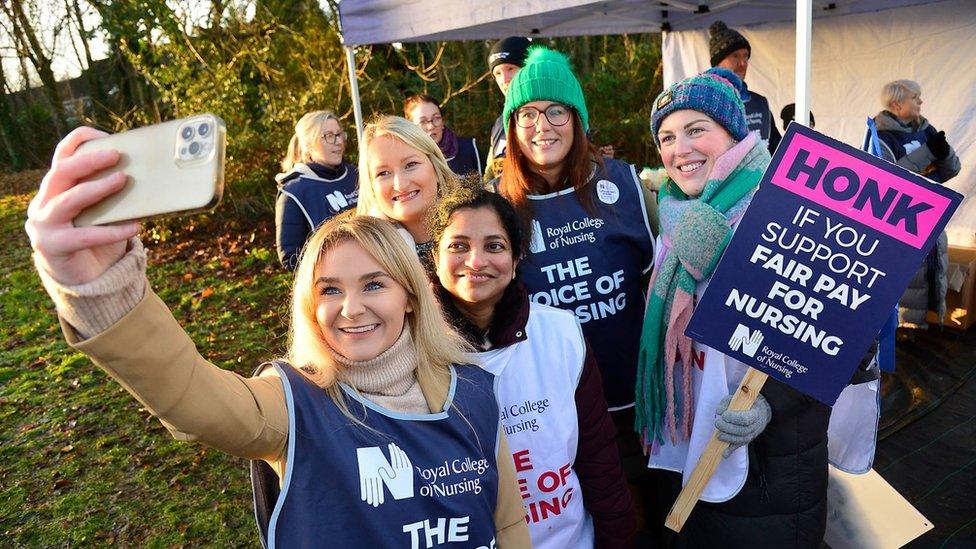
The RCN said it will set the government a 48-hour deadline to discuss pay.
The RCN said there are about 3,000 nursing vacancies in Northern Ireland.
Andrew Doherty, the RCN's representative and trade union secretary for the Western Trust, said many members he had spoken with believed this was "as bad as everybody has known it within the health service".
"We have high numbers of vacancies...that means for every team there is at least one nurse missing and then combine that with absence or sickness figures and we have teams that are really, really short on staff," he told BBC Radio Foyle.
"That means patient care is unfortunately being undone."
How have services been hit?
The walkouts have affected hundreds of patients across Northern Ireland.
In the Belfast Health Trust, 175 new outpatient appointments, 289 outpatient reviews and 26 inpatient day cases were cancelled.
The South Eastern Trust said 17 endoscopy investigations were postponed, 15 surgical procedures cancelled, 229 outpatient appointments cancelled and the minor injuries unit at Ards Hospital closed.
The Southern Trust said 204 outpatients appoints were cancelled, 28 day cases and nine inpatient appointments were cancelled, while 448 appointments would not go ahead within the older people and primary care division. The minor injuries service at South Tyrone Hospital was closed.
In the Western Trust some 515 outpatient appointments were postponed and 37 planned inpatient and day case procedures were cancelled.
In the Northern Trust 154 outpatient appointments were affected.
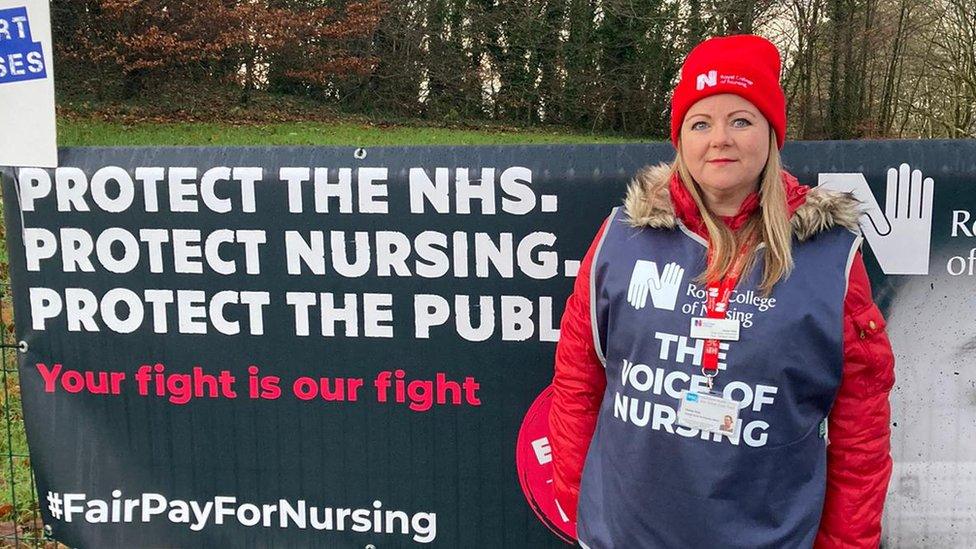
Denise Kelly is joining the picket line at Antrim Area Hospital
Denise Kelly is a clinical nurse at Antrim Area Hospital and said staffing shortages were affecting staff and patients every day.
"Nurses are going home demoralised, destabilised; they have a moral injury because they feel they are not able to give the care those patients deserve," she said.
Scottish nurses who are not on strike joined their colleagues in Northern Ireland in a show of solidarity this morning.
At the Royal Victoria Hospital Belfast, nurses have also gathered at the picket line with some joining the strike action after a night shift.
Christopher Boyle, who is a senior cardiac nurse at the hospital, said the strikes are about more just staff pay.
He said: "It's about protecting the NHS, protecting people. This is not about us being greedy and I am sure the public understand that."
- Published2 May 2023
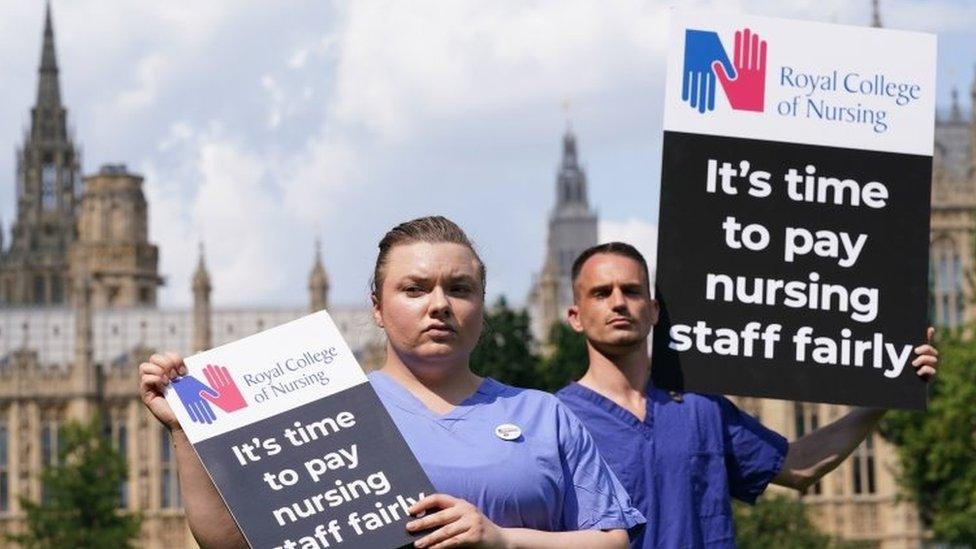
- Published15 December 2022

- Published15 December 2022
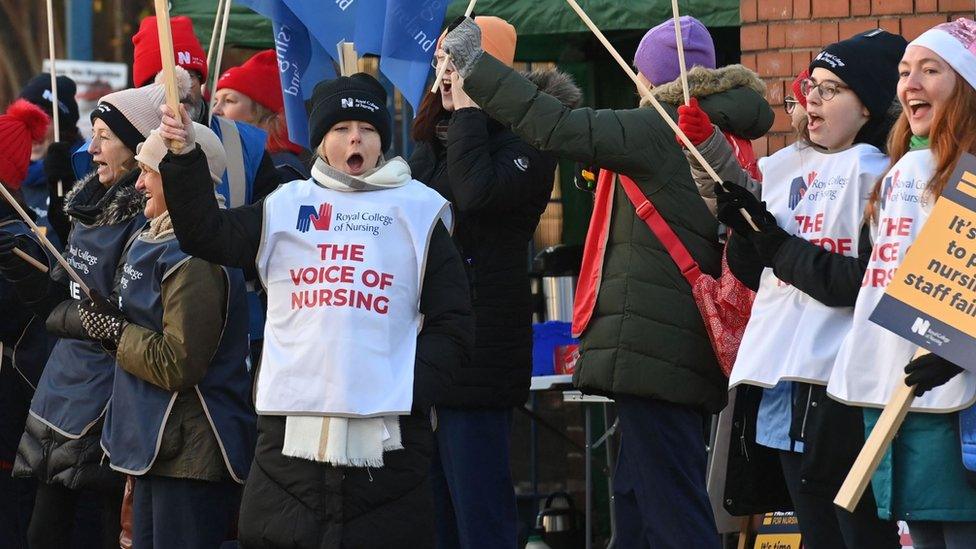
- Published15 December 2022

- Published8 December 2022
